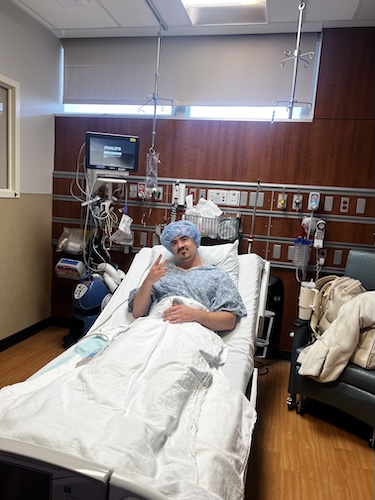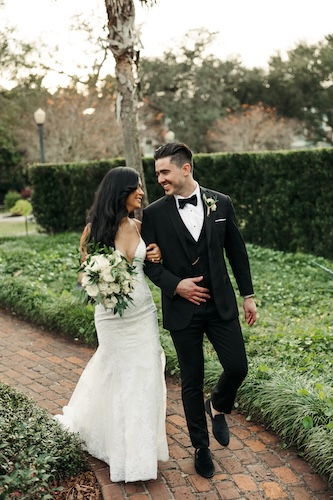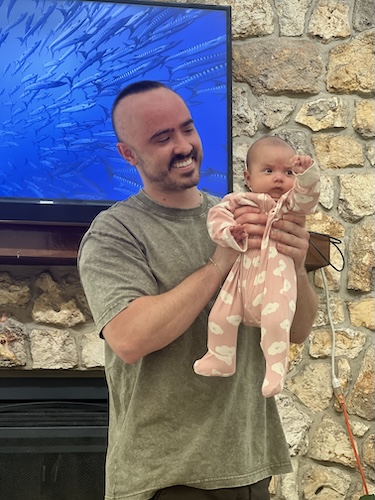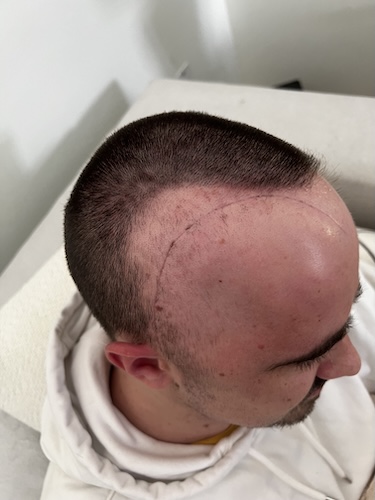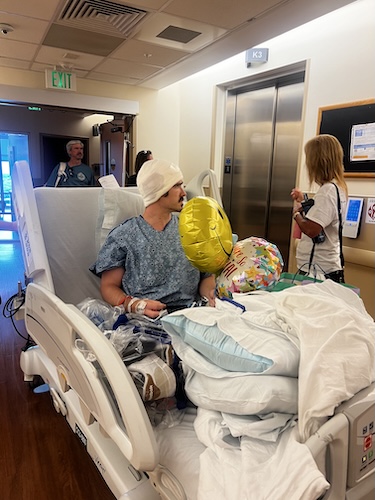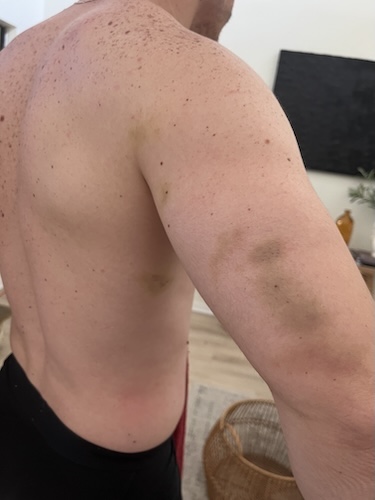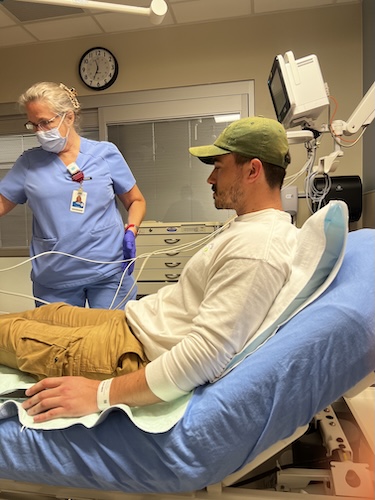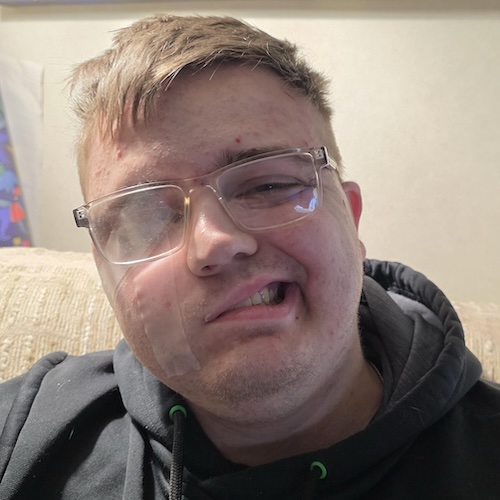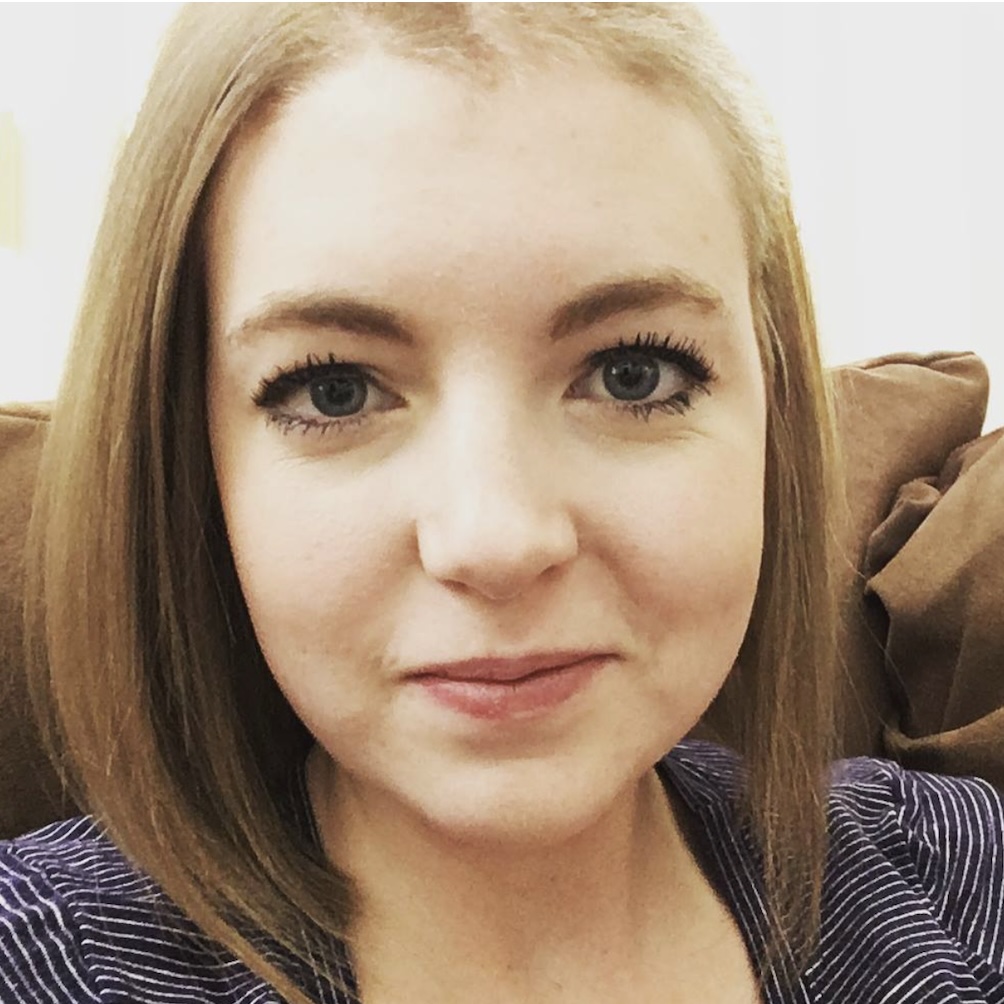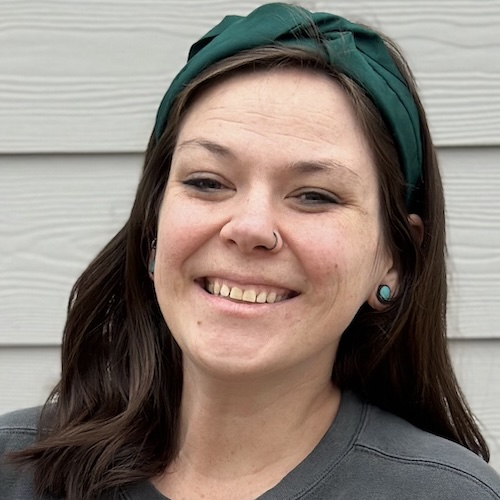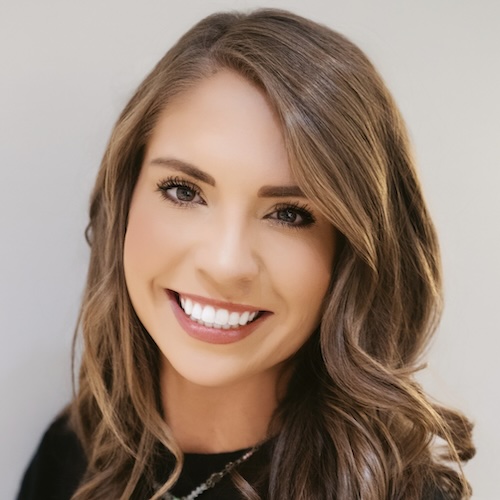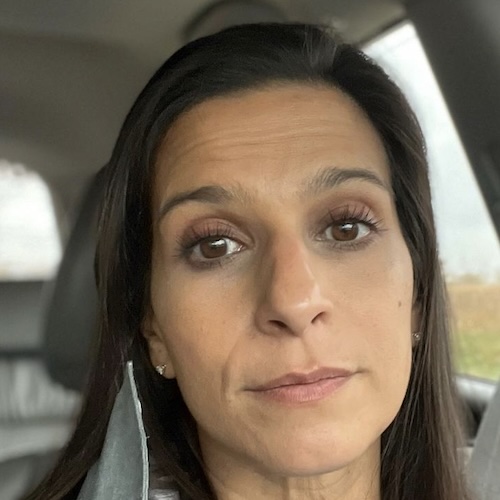Building a Family While Facing Brain Cancer: Edward’s Grade 3 Astrocytoma (IDH mutation)
Edward has always loved art, film, and storytelling, which led to a thriving career in television. But his life took an unexpected detour when he was diagnosed with brain cancer in 2024. In the fall of 2023, after a full day’s shoot, he had a seizure while alone in a hotel room and woke up disoriented and sore. He shrugged it off as an isolated incident, but later started to experience persistent headaches, light leaks in his vision, and brief episodes of confusion.
Interviewed by: Nikki Murphy
Edited by: Chris Sanchez
The doctors Edward consulted suggested that he change his lifestyle and said he didn’t need thorough testing. It wasn’t until his honeymoon in Spain, after he had an episode during which he felt completely disconnected from reality, that he sought a second opinion. An MRI revealed a mass in his right frontal lobe, and it was diagnosed as a grade 3 astrocytoma with an IDH mutation, a form of brain cancer. (Editor’s Note: An IDH-mutant astrocytoma develops from astrocytes, a type of star-shaped supportive cell in the nervous system. Mutations in the IDH gene, which normally encode enzymes that help with cell nutrition, result in byproducts that promote tumor growth instead.)
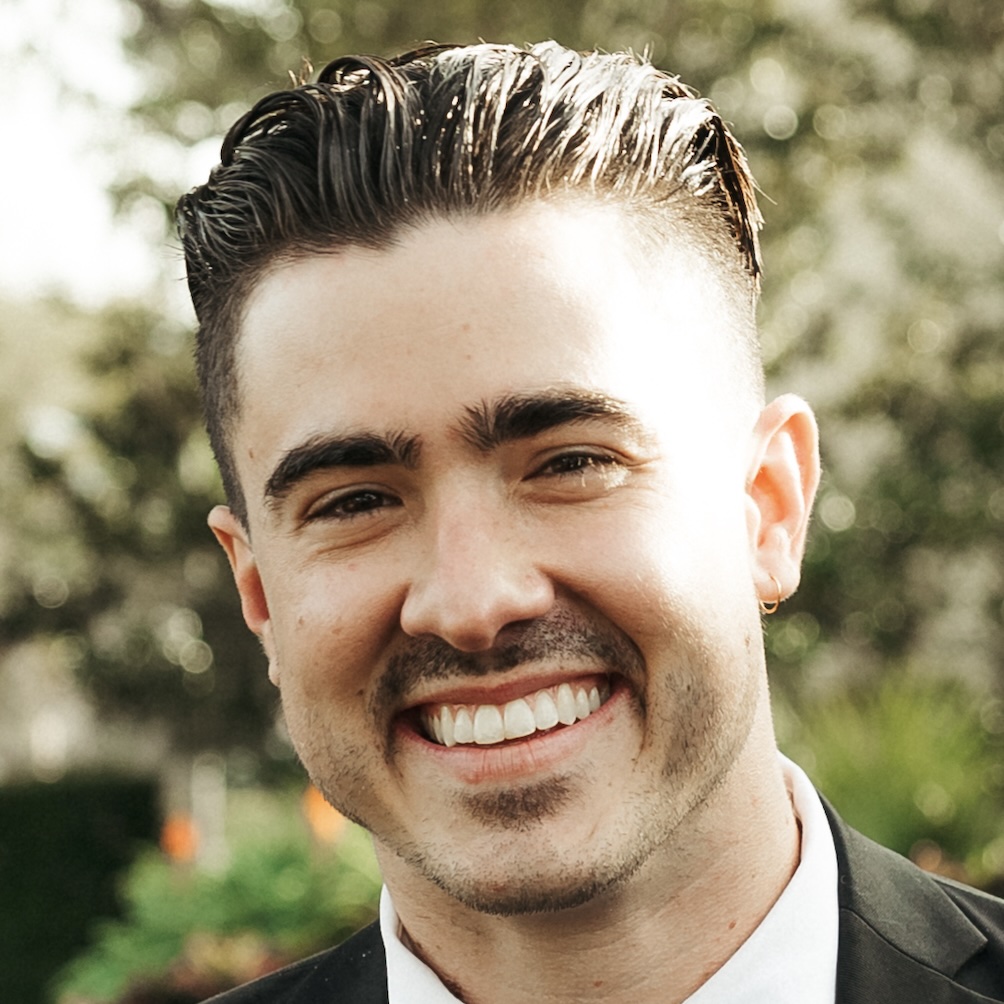
The news that he had a rare cancer hit hard, especially as Edward was preparing to welcome his first child. Just days later, he underwent surgery that successfully removed 99.8% of the tumor. The rest of it was treated through chemotherapy and radiation to spare his motor and speech functions.
The emotional aftermath of these treatments was challenging, too. Edward was overwhelmed when he tried to process a prognosis of 10 to 12 years alongside becoming a new father. He also struggled with anxiety and mood swings due to his surgery. He leaned on therapy, which helped him develop coping mechanisms to support both himself and his family.
Edward now knows that managing brain cancer isn’t just about getting the right treatment. It’s also about mental resilience. He emphasizes the importance of mental health, acknowledging how therapy and the support of loved ones have helped him and his family. He’s also developed healthier habits, including clean eating, exercise, and mindfulness.
Despite the challenges he’s faced due to brain cancer, Edward is filled with gratitude. He’s learned to love simplicity, cherishing every moment with his daughter and family. He now works to help others by spreading hope and advocating for awareness about brain cancer.
Watch Edward’s video and scroll down to read the transcript of his interview. You’ll gain more insights into:
- How an unsettling one-time seizure led him to his life-changing brain cancer diagnosis
- Why early symptoms of brain cancer are often dismissed
- The hidden challenges of balancing new fatherhood with brain cancer treatment
- How mental health and therapy became Edward’s pillars of strength after surgery
- The ways brain cancer reshaped his life’s purpose and perspective
- Name: Edward H.
- Age at Diagnosis:
- 30
- Diagnosis:
- Brain Cancer (Astrocytoma with IDH Mutation)
- Grade:
- Grade 3
- Symptoms:
- Seizure
- Eye aura
- Persistent headache
- Numbness in hands and arms
- Treatments:
- Surgery: craniotomy
- Radiation therapy
- Chemotherapy
This interview has been edited for clarity and length. This is not medical advice. Please consult with your healthcare provider to make informed treatment decisions.
The views and opinions expressed in this interview do not necessarily reflect those of The Patient Story.
- My name is Edward
- The first red flag that warned me that something was wrong
- My symptoms got worse on our honeymoon
- I finally went in for an MRI
- What surgery was like
- The moment everything changed
- My treatment plan
- The plan moving forward
- Facing my prognosis
- Where I’m finding support
- What I want others to know
My name is Edward
I had a glioma. Astrocytoma, grade 3, with IDH mutation. I am now 32 years old.
My passion has always been art, movies, film, and anything in that realm. And I’ve turned that passion and hobby into a career. For the last five years, I’ve been filming for Educational Television for PBS and CNBC.
The first red flag that warned me that something was wrong
My first and only seizure was in the fall of 2023. I was in Houston, Texas, and I had just finished a full-day shoot. I get back to my hotel, and I’m dumping footage from my hard drives for the day. And all of a sudden, I wake up on the floor, throwing up in the hotel room trash can, and I don’t know where I am. My entire body feels super sore, like I’ve just been working out for days and days.
I call my wife, and I tell her I don’t know what happened, but I just woke up on the floor. And that I don’t really know where I am, I’m super disoriented. When I get home, I notice that the back right of my right arm has bruises all over it. I realized then that I had fallen onto my camera case in the hotel room. I don’t remember standing up. I don’t remember moving anywhere.
After the first seizure, there really weren’t a lot of symptoms. It was a slow burn into what I was feeling. I started to have a slight head pressure in my temples that would throb. If I leaned down to pick up something or got up too fast, simple movements that we do every day, my head would throb right afterwards. It would go away in about 30 seconds to a minute. I also started getting light leaks and light tears in my vision. I look them up on the internet, and everybody says it’s like a migraine with aura. And so I thought, “Maybe I’m just getting small migraines.”
My primary doctor at the time and I talked about some things, like getting an MRI, but since I didn’t have a history of anything, they just told me to eat healthier and go on walks. That seemed like a cop-out.
My symptoms got worse on our honeymoon
I got married and we went on our honeymoon. I had an episode in Spain where I could see, but I couldn’t really comprehend what I was seeing. It doesn’t seem like it makes any sense, but I wasn’t really there. I could still move and function, but I didn’t really know what I was doing. I was just disoriented.
I found out later that it could have been a conscious seizure, which is strange. After that, I switched primary doctors. I felt that something was off, and I just wanted to make sure that everything was good. So I found a new primary. They set me up with an MRI, but I almost didn’t go through with the MRI because I was feeling better. But my wife said, “No, you should still go and check, make sure everything’s good.” I went, “Maybe, we’ll see.”
One day, when I was working from my house, my hands and my arms went numb. It convinced me to have myself checked to see if I was okay. Which, at the end of the day, I wasn’t.
I finally went in for an MRI
I’ve never had an MRI. So they told me what to do, and it was super casual going in. But they helped me out of the MRI when I was done, which I thought was strange. And then I saw the radiologist standing in the doorway of the MRI. He asked me, “How’d you get here today?” And I told him that I drove. He hesitantly said, “Okay. We found a pretty significant mass in your brain, your right frontal lobe. You should go to the ER.
The denial phase set in really fast. And I started asking questions there. I get on the road and I’m driving my way to the hospital, and all I’m thinking about is the fact that my wife is pregnant and that my daughter is coming in the next few weeks.
I get to the emergency room. I’m there for around five hours. They admitted me. That entire time, my new primary was talking to the hospital. The radiologist was talking to my primary, which is wonderful communication. And they showed me the MRI scan of a tumor the size of an orange in my frontal lobe. And they tell me that we’re going to be doing surgery in the next four days.
What surgery was like
I got admitted to the hospital after the ER on a Wednesday. I stayed the night and went home Thursday. And then from Friday to Sunday, I had all my friends over at my house. We went out and hung out at a local spot. Everybody was in shock, but very supportive. And come Monday, I got to the hospital at around 9 a.m. and they pulled me back to pre-operation, and hooked me up with all the the bells and whistles.
My buddy, Joey, a firefighter, got off shift at 8 a.m. after working all night, and he came straight to the hospital to see me and my wife. After about 45 minutes in the pre-op, they wheeled me back to the operating room, shot liquid Xanax into my veins, and put whatever they put on my face to make me go to sleep. And I woke up on the 11th floor seamlessly.
The surgery was super successful. They got out 99.8% of the tumor, because if they had gone any further, they could have affected my motor movements and speech. So the surgeon made the executive decision to just kind of hold off the rest, and we’d zap it with chemo and radiation.
I had a gnarly scar and a ton of hair, too. It was pretty impressive. They shaved just where they were doing the incision. Not my whole head or anything. From there, recovery took about two months. I had to lie in bed upright to sleep. I couldn’t bend over and pick anything up. I also couldn’t pick up more than five pounds. I had a little grabber claw walking around my house.
After those two months, I started six weeks of chemo and radiation.
The moment everything changed
Once the surgery was completed, I stayed five days in the hospital recovering. My oncologist at the time came in to speak about what this thing was, and my entire family was there too. My mom was probably the one asking the most questions. The oncologist told us that it’s a glioma astrocytoma, grade three. But I also have an IDH mutation, which almost makes it like a 2.5. So having an IDH mutant tumor is actually a good thing, because it kind of dumbs down its strength.
I’m still in a daze because nothing like this has ever happened to my family. And, of course, I’m the guinea pig of getting something new in the family.
The prognosis came either on the first or the second visit after the hospital. That time, it was just me and my wife in there. I didn’t really know what a prognosis was. My oncologist said, “Do you want to know the prognosis?” I said, “Sure.” He told me in front of my pregnant wife that I might have a 10- to 12-year lifespan based on the research that they have and after the treatment that they do on people who have what I have.
I could tell that my wife was not in the right state of mind to receive this prognosis. But I’ve always been the one to go, “Okay, what do we do now?”
I don’t dwell on a lot of stuff. But that prognosis was eye-opening, especially because in three weeks, our daughter was going to be born. And I was thinking, “Right now, I’m battling this thing.” It was very hard to handle those emotions, because I just wanted to focus on my daughter.
My treatment plan
Unfortunately, for what I have, the options are very limited: radiation and chemo together. They need to cooperate to get the rest of that cancer out. So that was a no-brainer.
But then, after the six weeks of chemo and radiation together from November to April, I did six months of just chemo. Five days a month for six months. And my new oncologist told me, “There’s really no research or science behind whether you should do chemo for a year or six months.” With how it was messing with my body and what little research they had, I decided to do the six months because my quality of life was just not great.
And when it comes to radiation, now it’s September. It should be weaning out of my body now, but it stayed in my body for a year. And the chemo was kind of fighting with it, because they’re like a team.
I knew a little bit about chemotherapy, but not much. The good thing about what I did is that I took pills orally at home, and so I had to eat a healthy dinner by 6:30 p.m. every night. I couldn’t snack or eat after 6:30 because my body needed to digest all my food, and my stomach would need to be as empty as possible when I would take the chemo at 8:30 every night. And so that was every day.
When the radiation started, I had to get fitted for a mask. And every day, five days a week, for six weeks, I would go in, I would lie down, they would put the mask over my face and lock it to the table. They would then send a laser back and forth over my head. It would probably take around seven minutes. And after about three weeks of radiation, I started losing my hair right where the radiation was going. Not from the chemo.
Each month, I would have about a day or two where I’m just down and out. I have to sleep. I have to rest, I can’t work. It would just kind of smack me in the face with being so tired. And due to the chemo, I couldn’t drink any alcohol — my diet had to be super, super clean. The chemo would work best around midnight or 1 a.m. when I was in REM sleep, and on an empty stomach. But I would wake up with stomach aches or a sensation I could just feel in my chest or whatever, due to the poison that’s in those pills working. But towards the end of my six-month chemo cycle, I did start getting actually sick on the midday of the following day. It started accumulating in my body.
The plan moving forward
After my six weeks of chemo and radiation, I got to ring the bell.
So that was fun. But after the six months, it was — oh my God, it was a breath of fresh air. It was the realization that I don’t have to do this every single night anymore. I don’t have to have that one week out of my month where I feel terrible.
But it’s also been sort of good to me, because it taught me better and healthier eating and diet. And I also got to learn that exercise is so important. Vitamins, too.
I lost a decent amount of weight, but it was weight that I wanted to lose. And now it’s just about maintaining that healthy lifestyle and exercising. And obviously, I had to seek therapy. No person can do this alone. But it’s been good.
Now, my daughter is everything, and I want to be everything for her.
It’s given me a new perspective on life.
If anything does come back or whatever, it’s chemo or surgery.
Facing my prognosis
The biggest challenge, honestly, was coming to terms with my prognosis. I think it’s really weird as a human being to practically have a ticking clock on your shoulders, so to speak. Nobody I know has anything like that.
I feel like what I’m going through is different. But I’m also challenged to not get people to pity me. I’m still trying to be the same.
Another challenge is dealing with my heightened emotions ever since surgery. All of our emotions are plugged into our frontal lobe, and now I have half of my frontal lobe left.
Before my surgery, I was really just kind of carefree. Whatever happens, happens. I’d just laugh it off. But now, it’s like the littlest things can set me off. I can now be anxious and anticipate bad stuff. That’s a big challenge — trying to battle all that stuff while learning to navigate the new me. My therapist helped me a lot. She’s given me methods and tips for when I do feel a certain way.
I’m learning to be strong for my daughter and for my wife, so that my wife isn’t stressed out being around me because of my new mood. I’m well aware of what I need to do to be a good dad and husband, and I’m focusing on that.
And if I do get super angry, I’ll just go outside for a little bit, do some yard work. I recently got a bike, and I do early morning bike rides. Anything I can do to distract my mind from what triggered me. That’s a new tricky task.
Where I’m finding support
I’ve actually been thinking about joining some sort of support group. I’ve been in talks with one of the pastors at my church who does small groups for men.
But I’m really privileged to have a village behind me when it comes to my family, my friends, including the ones I grew up with, and my parents. They did a meal train for months. They donated to help us financially. I’ve been lucky that everyone around me has been incredibly supportive. What do I need? What does my family need? What does my daughter need? And I am forever grateful for that.
My perception of life has definitely changed. It feels weird to say it, but I feel grateful to have had this happen to me. Now, what will fulfill my life is a lot simpler than I thought it was going to be, if that makes sense. The things that I want now have changed. The person I want to be has changed. And I’ve found that one of my biggest goals now is just to help other people.
What I want others to know
You need hope. But hope can come in different forms. And I think keeping that idea of hope and positivity goes a really long way.
Being positive and hopeful can heal you. That’s my opinion. And having that positive outlook can heal you and can heal people around you.
You don’t really know what people are going through. We all put up fronts. Just be courteous. Be generous.
It’s weird to say, but life is short. Do things more for others than for yourself.

Inspired by Edward's story?
Share your story, too!
